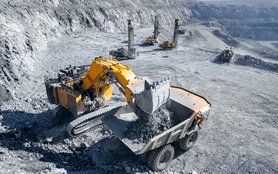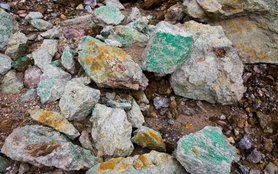To meet the growing demand for clean energy technology, including solar panels and electric vehicles, the mining sector is set to soar. However, a new report from Oxfam finds that mining companies are not prepared to support a just energy transition.
According to the International Energy Agency, the green mineral market is seeing a strong increase in investment as the world sets out to meet its decarbonization goals.
From mining towns in Mozambique to processing plants in Louisiana, a network of suppliers, workers, and investors are hoping to strike it rich on minerals like graphite, lithium, and cobalt.
However, those looking to profit on the latest boom should proceed with caution. Today’s mining sector is simply not fit to meet current demand. Miners have underinvested in new projects and banks are reluctant to offer traditional financing for mine expansions. Investors are shunning the sector citing supply chain concerns, long-term profitability questions, and environmental and human rights barriers.
New research from Oxfam should give investors further pause: Recharging Community Consent concludes that mining companies are not prepared to support a just energy transition, despite positioning themselves as climate champions.
Mining companies might be unloved, but they aren’t inexperienced. Many of the current challenges have past iterations. Mines, whether for renewable energy or otherwise, require lots of up-front capital and are often located in remote or contested territories, sometimes in conflict zones. Geopolitical tensions and trade wars are accelerating, but political shocks have always been part of the game.
In the end, mining companies have weathered crises before (plenty of their own making). Now, companies are benefitting from government interest and public financing, such as the Inflation Reduction Act (which, ironically, also revealed that the sector is not yet ready for an influx of capital).
What the sector can’t seem to manage is its image problem
Mining is one of the world’s most poorly-regarded industries–and for justifiable reason. Mining companies have a sordid history, ranging from direct violence against striking workers and human rights defenders to the slow (but hardly subtle) violence of pollution and cultural erasure.
Even in the scramble for green minerals, the sector seems stuck in the past: a contentious lithium mine on the Oregon-Nevada border has been dubbed an example of “green colonialism” and a similar mine in Chile is leaving Indigenous communities “high and dry.”
If mining companies want to attract investors and genuinely lead on climate, they must clean up their act.
This starts with shoring up lagging public policies. In Recharging Community Consent, Oxfam analyzed the policies of 43 mining companies on several intersecting issues related to community consent, human rights due diligence, gender justice, and the protection of human rights defenders. Only eight of the 43 surveyed companies publicly recognized the legitimacy of human rights defenders and had zero tolerance for any form of retaliation against those defenders.
Most mining companies do not currently have the necessary policies in place to respect the rights of impacted communities, especially Indigenous communities who are particularly vulnerable to the threat of “green colonialism.”
Corporate commitments to free, prior, and informed consent (FPIC) have increased significantly over the last decade, but still less than one-third of companies in this study have a public FPIC commitment. Alarmingly, only two surveyed companies had clear and unequivocal public commitments to respect FPIC, a right under international law.
Policy changes alone are insufficient for meeting the moment. Effective FPIC implementation requires companies to respect Indigenous sovereignty, collective decision-making processes that allow for meaningful community engagement, and–when relevant–a community’s decision to say “no” to mining. Otherwise, FPIC commitments risk serving as mere window dressing–which is, unfortunately, too often the case.
Companies need to improve their public relations and community outreach efforts, too. Oxfam’s report details how project-level coordination and communication remains challenging.
Listening to the community is fundamental

According to Jorge Giquina Causa, who lives in the small village of Mtete near the Balama graphite mine in northern Mozambique, “this is the root cause of conflict [with communities]. They just dig and don’t really coordinate." While noting that companies “cannot do everything” he hopes to receive more information from the mine operator, possibly through a public notice board, and wants to see more direct investment in his community, including having his town’s access road paved.
Listening and responding to community leaders like Jorge is just one way companies can pursue a more just energy transition.
We all have a stake in seeing the mining sector succeed, not only because fossil fuel emissions continue unabated. The graphite from the mine next to Jorge, for example will eventually wind up the Mississippi River to a processing plant in the small city of Vidalia, Louisiana and onwards into electric vehicles sold around the world. Jobs, federal money, and environmental concerns are all on the line (not unlike the mining sector, Louisiana has a staggeringly poor environmental legacy).
Mining companies can lead on climate, and, in the end, it is in their economic interest to do so. Putting the burden of climate action on frontline communities already vulnerable to climate change will backfire–with buyers, investors, and communities themselves.
Companies must make a break from the past as they scramble for the resources of the future.

Read Oxfam's report, Recharging Community Consent



